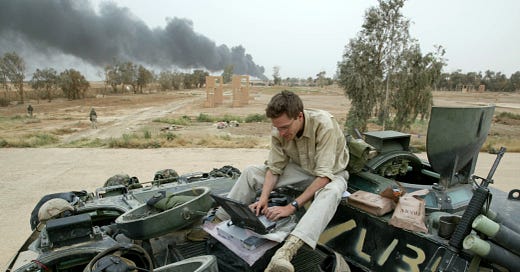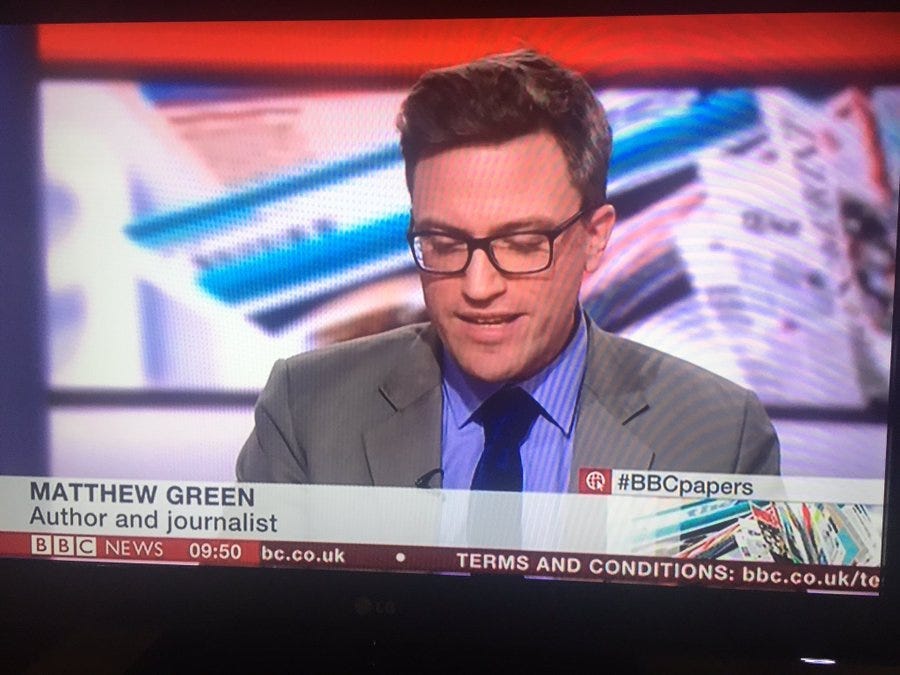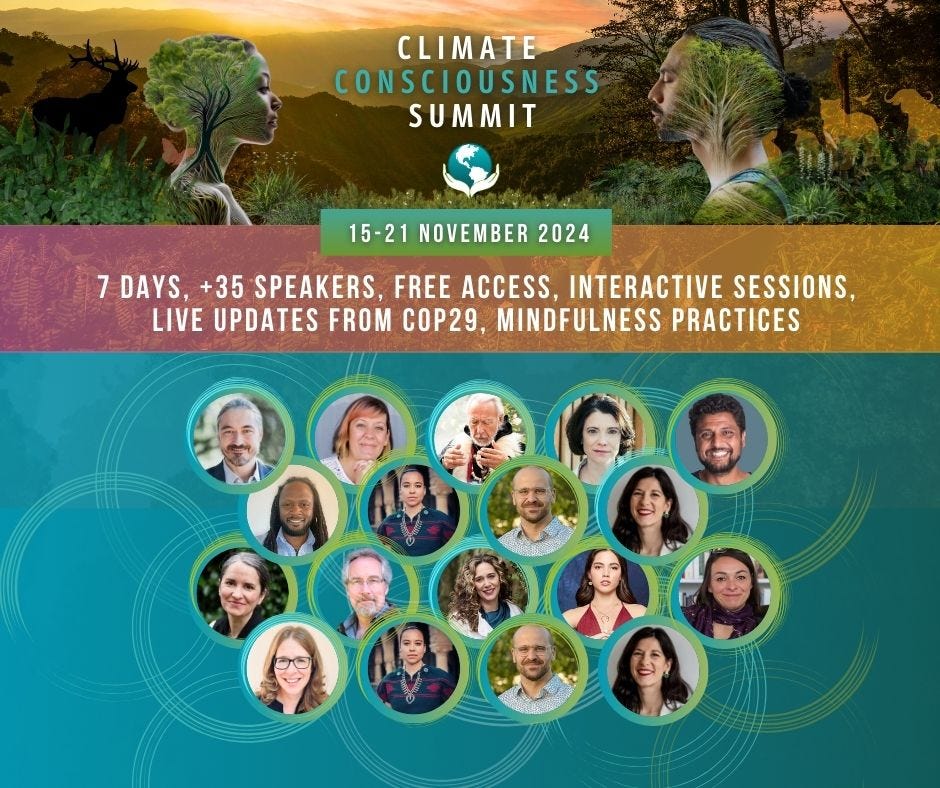If you liked reading this, feel free to click the ❤️ button on this post so more people can discover it on Substack 🙏
Climate psychologist Steffi Bednarek and I are offering a one-day workshop in London on Saturday, December 7 to support professionals to explore the conflicts we feel over our companies’ lack of response to the climate crisis. I’m very excited about this gathering, which I think will prove a powerful form of medicine for the anxiety, grief, numbness and overwhelm many of us feel in response to the planetary situation, and our employers’ relationships to it. Details here.
Survival Tool#38: Reflect on Your Life’s Larger Themes
When I was a Reuters trainee in Paris, I was so committed to the company that I once cut out a bunch of corporate logos, stuck them around the edges of a piece of black card, and fixed a passport photo of myself in the centre.
This childish picture frame was not meant for public display; I never showed it to anyone.
But looking back almost 25 years later, I can see how some very young part of myself had felt an impulse to express the newfound sense of solidity and confidence I’d felt as a result of winning a place on the company’s prestigious graduate training scheme.
It had been an initiatory test, of sorts, and I’d passed.
For years, I wanted nothing more than to be the best Reuters journalist I could be. I made a pact with myself that I would not allow romantic entanglements to get in the way of this goal. I agonised over inevitable mistakes I introduced into copy — a very public process in a company that rightly prides itself on flagging errors by adding the word “CORRECTED” in block capitals to the title of the re-issued version of a story. I felt deeply disconsolate when I missed out on assignments. I found the new world I’d entered — peopled by glamorous and accomplished colleagues from many nations, and focused on covering geopolitical upheaval — absolutely intoxicating.
I remember sitting in a bar in Nairobi, where I’d been assigned after Paris, and a colleague not much younger than me saying words to the effect of “So, are you a Reuters Lifer?” I’d denied it, thinking it would sound too unambitious to confess to being content with the idea of working for the same company until retirement.
But clearly, in her eyes, my fate had long since been sealed.
A Proper Job
In fact, I would quit Reuters (the first of three times) a few years later, delighted to be hired by the Financial Times. The FT was similar to Reuters in many ways, but more prestigious — and working there always felt to me a bit like an extension of attending an elite public school. We were treated very well, and there were lots of smart people around. I loved the job. But all the same, I can now recognise that I’d felt something deeply stifling about the place — crystalised most clearly for me in the endless manoeuvring by top-tier journalists and editors for the then editor-in-chief Lionel Barber’s favour. The spectacle seemed to me to debase the talents of all the supplicants, and create an unhealthy Court-of-Louis-XIV-style vibe that made poor editorial judgments more likely.
Reuters drew me back. I rejoined while working in Afghanistan and Pakistan, then took another break to write a book, resigned a second time, then ended up freelancing — not super successfully.
When we had our daughter Matilda, and it belatedly dawned on me that I really did need a proper job, I felt overwhelming gratitude to Reuters for hiring me back in 2018 on a temporary contract to work on a series of stories on the impact of climate change on marine communities. I’d struggled after Matilda had been born, and this gig was precisely the break I’d needed — financially, but more importantly, psychologically. I was home again, or so I’d thought.
In many ways, that year was a highlight of my professional life — incredible colleagues, a one-of-a-kind, world class editor in the form of the late Kari Howard, and the privilege of working on a subject I cared about. The series we produced — called Ocean Shock — won a bunch of awards, but more importantly, the process of producing it was a joy.
It was easy to convince myself that it must be destiny knocking when I was offered a permanent role as climate correspondent, in 2019, a peak year for climate activism. It was a great time to be on the beat: Extinction Rebellion was camped out in London, and Greta Thunberg was always in the news. (Matilda got to meet her briefly when I interviewed her via Zoom).
True, returning to the office, and running back into many former colleagues who’d never left, had a bittersweet quality. A friend who’d joined Reuters the same day as me but long since carved a very different path remarked: “It must feel a bit like moving back into your parents’ house.” And in a way, it did — with similar kinds of plusses and minuses. Only I was no longer the boy I’d been in Paris. I was a man, now. And the disconnect between my expectations of what a sane and supportive work environment might look like, and what I experienced, became impossible to tolerate. (Survival Tool#1: Admit Your Workplace Is Toxic).
I sometimes wonder whether — if my relationship with the management at Reuters had been different — I’d still be there now. But I rather suspect that I wouldn’t have been able to sustain myself in that environment indefinitely, due to the growing inner conflict I felt between my values, and the system I served. (Resonant World#33: Moving Into Integrity).
I want to state very clearly that I have enormous respect for many Reuters journalists and editors, and still count cherished friends in the company. Reuters publishes some important stories, especially in this age of misinformation, and the growing toll of Reuters staff killed in the line of duty attests to the risks involved. There’s a part of me that would have been pretty content had the conditions that reigned in my personal bubble working on Ocean Shock continued indefinitely. The undeniably magical side of Reuters might have allowed me to justify staying.
But that’s not what happened. The bubble burst. And I can now see that it couldn’t have been any other way.
Handmaidens of Big Oil
For me, perhaps the greatest frustration was recognising the mismatch between the systemic impact on the media a company of Reuters’ size and influence wields, and the management’s apparent inability or unwillingness to reflect in any meaningful way on their responsibilities in such a crucial decade for climate action. (Resonant World #80: Big Oil and the Media).
I’ve written elsewhere about my disillusionment with Reuters’ decision to host trade shows expressly designed to hasten the extraction of oil and gas, and its sponsorship deals with Saudi Aramco, Shell and other oil companies. I fear that the integrity of current editor-in-chief Alessandra Galloni’s tenure will be forever damaged by her willingness to endorse these deals — which must be approved by the editor-in-chief, according to Reuters’ internal regulations. (I have emailed Alessandra and other senior Reuters leadership seeking comment on these deals in the past, but they haven’t yet replied). (Resonant World#32: Processing my Reuters Climate Karma). (Resonant World #58: 50 Reasons Why Reuters Should Stop Working for the Fossil Fuel Industry).

But these oil and gas deals are a symptom, not a cause.
Because, while Reuters produces some excellent journalism, it is — at the risk of stating the obvious — ultimately a crucial component of the late capitalist system that has caused the climate and death of nature crises.1 It would therefore be naive to imagine the company’s leaders would feel any great sense of responsibility for trying to scrutinise that system — or even spend any time thinking about how to try.
Decisions about what counts as “news,” whose voices to privilege, and how to deploy journalistic resources have not — and never will — meet the overwhelming demands of the moment, because the prism through which the company sees the world is itself a part of the reason the climate and nature crises have reached their current pass.
These values are not only reflected in the way Reuters editors and journalists approach their jobs — they’re also reflected in the way staff are treated.
Fundamentally, the company — like all big corporations — is a “power-over” hierarchy. It is a place where you leave your personal values and sense of what’s right and wrong at the door — that’s part of the price of going through the turnstile. You agree not to express your opinions — or even have an opinion — in the name of “freedom from bias”. This deal can’t survive first contact with the most elementary philosophical scrutiny because the idea of “view-from-nowhere” journalism it’s based on was conclusively debunked years ago. Nonetheless, it’s a deal the 2,500 Reuters journalists accept every day.
It’s an agreement I could no longer make.
At the height of my disenchantment with Reuters, I used to fantasise about being called into a meeting around a boardroom table by the then editor-in-chief Stephen Adler, and assembled senior leadership, and offered an apology for the way I’d been treated. In my fantasy, I would have been given free rein to cover movements dedicated to societal transformation in this decisive moment. (I did once offer to serve in such a capacity as a self-styled “new politics correspondent” and the answer came back from the higher-ups that a “stake had been driven through the heart” of my proposal. A later offer to carve out a new beat as “mental health correspondent” met a similar fate).
Of course, the fact I could even indulge such imaginings showed how far out of touch with reality I was.
I also recognise, again with the benefit of hindsight, that there was something fundamentally unskilful about my attempts to advocate for change from within Reuters. I’d been hired to conform — not to shake things up. And I hadn’t yet developed the kinds of subtle competencies or relational precision that might have helped at least some of my interventions land more smoothly. That realisation has become ever clearer to me over the past few years of immersive training in the principles of integrating individual, inter-generational and collective trauma with Thomas Hübl and team. (Survival Tool#26: Become Trauma-informed).
Still, I can safely say that the boy who made collages of Reuters logos in his spare time is long gone. In mid-life, I’m immensely grateful for all the incredible opportunities the company gave me, the friends I made, and the hard lessons I learned. My task now is to integrate these experiences more deeply, and put what wisdom I can glean at the service of those working at the intersection between the global climate and trauma healing movements, the niche I now consider home.
Summary:
Reflect on what your toxic workplace ordeal reveals about the values you hold dear, and bring your working life into ever closer alignment with them.
Climate Conciousness Summit 2024 Now Open to Register
I’m excited to be serving as as co-host on the Climate Consciousness Summit 2024, staged by the Pocket Project in partnership with DeSmog. This unique gathering will bring together leaders from the climate movement and global trauma healing community for seven days of generative dialogues. See you there!
I consult on surviving toxic workplaces; and can also help you navigate your toxic workplace via the Tarot. Click here to inquire:
I write Toxic Workplace Survival Guy during my spare time from working as an editor at nonprofit climate news service DeSmog (a model workplace). Subscribing, sharing, liking, commenting or buying me a coffee helps make this project sustainable. Thank you!
The phrase “death of nature” comes from The Death of Nature: Women, Ecology and the Scientific Revolution, a 1980 book by historian Carolyn Merchant.








there are so many ways a person could tell this story - and it is one told, though not often often enough - and we would forgive a bit of self-righteousness. but this is free of that judgmentalism while also providing an exposé of Reuters, which i loved too. great to get acquainted with you this way Matthew - looking forward to more…
I’m very interested in reading about your journey, Matthew, and how you found your right place. Thank you for another great essay, and for offering hard-won wisdom and inspiration to readers.